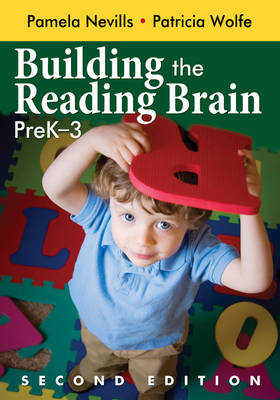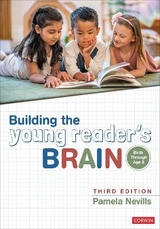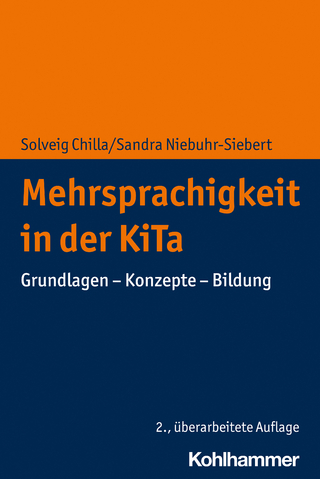
Building the Reading Brain, PreK-3
Corwin Press Inc (Verlag)
978-1-4129-6326-8 (ISBN)
"An absolute must-read, must-understand, and must-do for all primary teachers and principals. Nevills and Wolfe′s book addresses the difficult issues of diagnosis and intervention with early readers before they begin to struggle."
—Judy Bean, Director of Curriculum, Instruction, & Assessment
Colville School District, WA
"A unique resource that provides a biological foundation for effective reading strategies. It is a valuable resource for any educator."
—Deborah Tucker, Science and Literacy Education Consultant
Discover how children′s brains change as they develop early reading skills!
This updated edition of the best-selling book covers brain theory and research to give educators a clear picture of how children acquire and develop language skills in preparation for reading.
Moving through skills acquisition from birth to age eight, this resource provides best teaching practices for fostering critical literacy skills for each age group. This second edition features updated research, expanded information on English learners and Response to Intervention, and information about mirror neurons, sensory input, and decoding pathways. Readers will find:
Developmentally appropriate, brain-friendly strategies for building phonemic awareness, phonics, vocabulary, comprehension, and fluency skills
Instructional applications for games, music, and play
Interventions for children with early reading difficulties
Building the Reading Brain, PreK–3 sheds light on early childhood cognition and language development to help teachers provide all young learners with a strong foundation for reading success.
Pamela Nevills is first and foremost a teacher of children and adults. Her passion for teaching includes a full range of educator experiences from teaching in the primary grades, to teaching middle and high school, to being a teacher supervisor and instructor in university undergraduate, graduate, and doctoral programs. She participates in local, state, and national educational committees in the area of special education. As a two-time member of the instructional textbook selection committee for reading in the state of California, she brings expert knowledge of how children learn to read, and the materials teachers can use to follow the science of reading. Her passion for the cognitive and neurological aspects of reading stems from interactions with Dr. Pat Wolfe. Nevills is a national and international speaker and consultant on topics that include reading standards according to the Common Core; brain development from infancy to adulthood; all aspects of cognitive, neurological involvement for reading; and school management and design for teaching reading. Writing became a part of Nevills’s work as she published for newsletters, the state of California, the Journal of Staff Development, and Corwin. Her involvement also includes research and studies for church organizations and an advisory board position for preschool. To contact Pamela Nevills, please email panevills@earthlink.net.. Patricia Wolfe is an independent consultant who speaks to educators in schools across the United States and in international schools. Her professional background includes public school teaching at all levels: staff development trainier for the Upland School District, director of instruction for the Napa County Office of Education, and a lead trainer for the International Principal Training Center in Rome and London. Her staff development experience includes workshops in Madeline Hunter’s Elements of Effective Teaching and Clinical Supervision, Anthony Gregorc′s Mind Styles, Carolyn Evertson’s Classroom Management and Organization, and peer coaching. She has been featured in a number of videotape productions and satellite broadcasts. Wolfe′s major interest over the past 20 years has centered on the educational implications and applications of current neuroscience, cognitive science, and educational research for teaching and learning. She can be reached at Mind Matters, Inc., 555 Randolph Street, Napa, CA 94559, Phone and Fax: (707) 226-1777, Web site: www.patwolfe.com
Acknowledgments
About the Authors
Introduction
1. On the Nature of Reading
The Importance of Learning to Read
Why Learning to Read Is So Difficult
The Basics of Reading
Reflective Questions
2. What Happens in the Brain When Children Read Words?
Brain Basics
Reading Problems With a Biological Basis
Attention and Memory Systems
Reflective Questions
3. Building a Foundation for Reading: Birth to Age 3
Reading Relies on Early Language Skills
The Beginnings of Language
The Language Explosion: 1 to 2 Years
Precursors to Writing in the First 3 Years
Reflective Questions
4. Emerging Literacy During the Preschool Years
Mirror Neurons Drive Learning
Oral Language and Vocabulary
Print Awareness and Alphabet
Developing Writing Skills
Reflective Questions
5. Beginning to Read: Ages 5 and 6
Instruction Essentials for Emerging Readers
The Brain′s Memory Systems
Breaking Away From Static Teaching Tradition
Priming Skills for 5- and 6-Year-Olds
Reflective Questions
6. Breaking the Reading Code: Learning to Read Through Instruction
Reading and Language Arts Guidelines for Kindergarten and First Grade
Structuring the Brain for Decoding
Word Recognition Gains Sophistication
Teaching Encoding: Spelling and Writing
Reading Beyond Encoding and Decoding
Reflective Questions
7. Assessing and Responding to Readers at Risk
The Case for Early Assessment
English Language Learners
Assessments of Students With Regularly Developing Reading Skills
Differences in Brain Development
Assessment and Reading Standards
Response to Intervention: Reading Models
School Interventions That Work
Reflective Questions
8. Comprehension and Vocabulary: Challenges for Second Grade
Reading and Language Arts Guidelines for Second Grade
Instruction for Vocabulary and Comprehension
Ways to Teach the Curious Brain
Building the Brain for Comprehension
Strategic Reading With Comprehension in Mind
Reflective Questions
9. Putting Reading Skills to the Task: Expectations for Third Grade and Beyond
Reading and Language Arts Guidelines for Third Grade
Factors Affecting Reading Fluency
The Brain′s Rate of Processing
Developing Reading Fluency
Final Comments
Reflective Questions
10. Conclusion
A Child′s Brain and Reading: A Dozen Key Learnings
Glossary
Instructional Resources
References and Further Reading
Index
| Erscheint lt. Verlag | 17.2.2009 |
|---|---|
| Verlagsort | Thousand Oaks |
| Sprache | englisch |
| Maße | 177 x 254 mm |
| Gewicht | 480 g |
| Themenwelt | Sozialwissenschaften ► Pädagogik ► Vorschulpädagogik |
| ISBN-10 | 1-4129-6326-5 / 1412963265 |
| ISBN-13 | 978-1-4129-6326-8 / 9781412963268 |
| Zustand | Neuware |
| Informationen gemäß Produktsicherheitsverordnung (GPSR) | |
| Haben Sie eine Frage zum Produkt? |
aus dem Bereich



